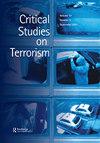“The ideology becomes a way to make sense of that disconnection”: Beliefs, behaviour and belonging – does ideology matter in countering violent extremism?
IF 2.5
Q2 POLITICAL SCIENCE
引用次数: 0
Abstract
ABSTRACTThe role of ideology in driving radicalisation to violent extremism is a more multifaceted and contested question than it may at first appear. While various explanatory models of radicalisation do suggest that ideology is an important precursor to the use of violence, other research has warned of various potential risks associated with focusing on the ideas in an individual’s mind, rather than the actions they carry out. This article engages with such complexities regarding the issue of ideology, drawing from interviews with twelve Countering Violent Extremism (CVE) practitioners based in various states and territories of Australia. Our focus is on their conceptual insights and working practices regarding the role of ideology in radicalisation to violent extremism, placing these in the context of existing literature, debates and other front-line experiences to explore whether, and in what ways, ideology matters for CVE efforts.KEYWORDS: Countering violent extremismideologyinterventionradicalisationsuspect communitiescounter-narratives Disclosure statementNo potential conflict of interest was reported by the author(s).Notes1. The distinction between “religiously” and “ideologically motivated violent extremism” was recently introduced by the Australian Security Intelligence Organisation (ASIO) in their threat categorisation. The terminology has been critiqued for its apparent de-emphasis of links between right-wing ideological beliefs and extremist violence, especially given the long history of specific focus on Islamic jihadist terrorism (Khalil Citation2021).Additional informationNotes on contributorsBen AdamsBen Adams is a Research Assistant in the School of Education at University of Queensland, having contributed to a number of projects focused on the sociology of schooling in a neoliberal context, gendered learner identities and subjectivities, masculinity studies, educational inequalities, countering violent extremism and restorative practices in schools.Garth StahlGarth Stahl is an Associate Professor in the School of Education at University of Queensland and Research Fellow, Australian Research Council (DECRA). His research interests lie on the nexus of neoliberalism and socio-cultural studies of education, identity, equity/inequality, and social change.Glenys ObergGlenys Oberg is a Research Assistant in the School of Education at University of Queensland, having contributed to a number of projects focused on trauma and education.“意识形态成为解释这种脱节的一种方式”:信仰、行为和归属感——意识形态在打击暴力极端主义中重要吗?
摘要意识形态在推动激进主义走向暴力极端主义的过程中所起的作用,是一个比乍看起来更加多面的、更有争议的问题。虽然对激进化的各种解释模式确实表明,意识形态是使用暴力的重要前兆,但其他研究警告说,关注个人头脑中的想法而不是他们所采取的行动,存在各种潜在风险。本文通过对澳大利亚各州和地区的12位反暴力极端主义(CVE)从业人员的采访,探讨了意识形态问题的复杂性。我们的重点是他们关于意识形态在激进到暴力极端主义中的作用的概念见解和工作实践,将这些放在现有文献,辩论和其他一线经验的背景下,探索意识形态是否以及以何种方式对CVE工作产生影响。关键词:打击暴力极端主义意识形态干预激进化可疑社区反叙事披露声明作者未报告潜在的利益冲突。澳大利亚安全情报组织(ASIO)最近在威胁分类中引入了“宗教”和“意识形态动机的暴力极端主义”之间的区别。该术语因其明显不强调右翼意识形态信仰与极端主义暴力之间的联系而受到批评,特别是考虑到长期以来特别关注伊斯兰圣战恐怖主义(Khalil Citation2021)。作者简介本·亚当斯本·亚当斯是昆士兰大学教育学院的研究助理,在新自由主义背景下的学校社会学、性别学习者身份和主体性、男子气概研究、教育不平等、打击暴力极端主义和学校恢复性实践等多个项目中做出了贡献。Garth Stahl,昆士兰大学教育学院副教授,澳大利亚研究理事会(DECRA)研究员。他的研究兴趣在于新自由主义与教育、身份、公平/不平等和社会变革的社会文化研究的关系。Glenys Oberg是昆士兰大学教育学院的一名研究助理,她参与了许多关于创伤和教育的项目。
本文章由计算机程序翻译,如有差异,请以英文原文为准。
求助全文
约1分钟内获得全文
求助全文

 求助内容:
求助内容: 应助结果提醒方式:
应助结果提醒方式:


